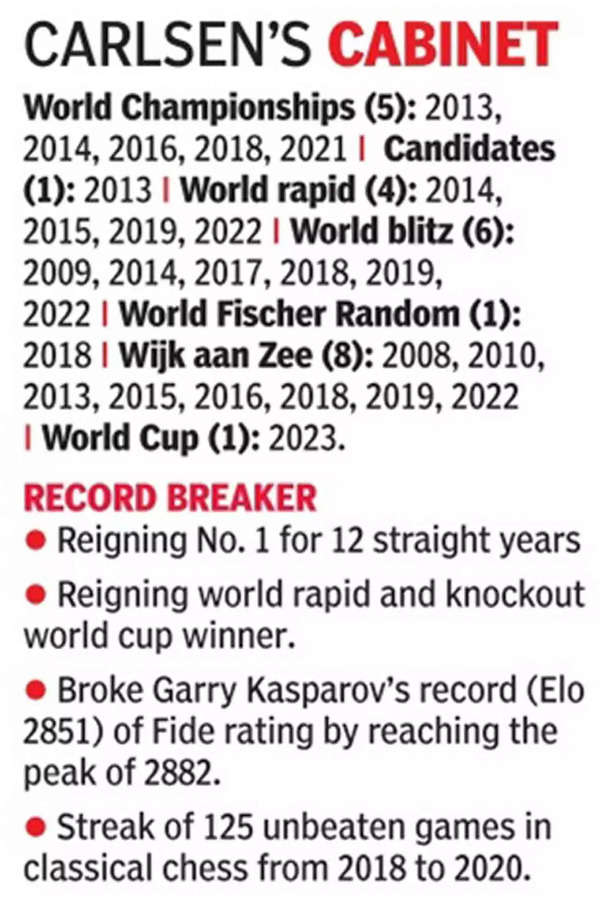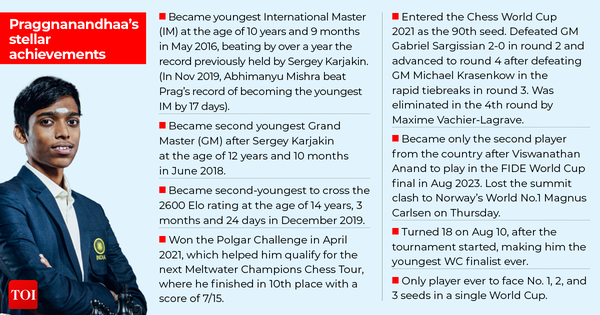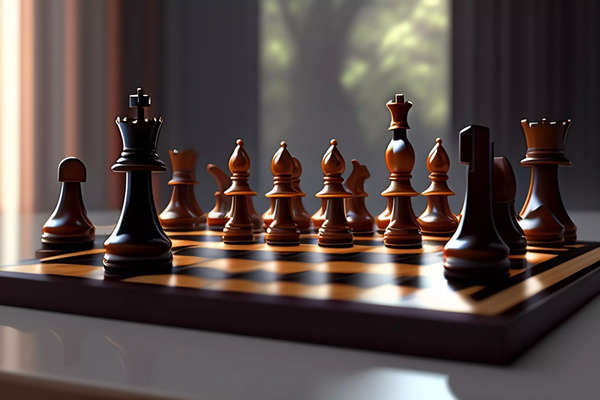Norwegian superstar Carlsen has been at the top of the sport for over a decade now but this was the first-ever World Cup title for the five-time World Championship winner. In fact he was playing a final at the World Cup for the first time.
The two classical games ended in a stalemate on Tuesday and Wednesday and the final required a tie-breaker to identify the winner.
Displaying his superior end-game skills, Carlsen won the first game in the Rapid format.
This gave Carlsen the one title he was desperate to win.
Carlsen winning the final via a tie-break over two rounds: ( Watch Video )
How Carlsen won the first game of the tie-break:
- Praggnanandhaa tried to snatch the initiative in the first rapid game with white pieces.
- Carlsen showed his peerless command in the endgame to win in 47 moves of the Modern Bishop’s opening.
- Praggnanandhaa was better out of the opening and was pressing hard on the kingside.
- With his queen manoeuvred to g-file and attack on the ‘f7’ pawn, Praggnanandhaa was in a position where he could have called the shots.
- But Carlsen first found the king move (16…Kg7), eased the pressure and followed that with an exchange of his queen and rook.
- What followed (two knights, rook and four pawns vs knight, bishop, rook and four pawns) was a supremely coordinated attack of two knights dancing to strangle the king
- Carlsen’s rook almost circulated on the board, landing on ‘a3’ square from ‘a8’ via the h8-h3 route. The final act involved a mating threat too.
First game: Watch video(From 12:25 till 1:15:54)
What Carlsen did right and where Prag faltered:
The game started with an Italian Opening, and Carlsen’s 11th move, Pawn to d5, cost him more than four minutes. He then pushed his pawn to g5. Praggnanandhaa made a big mistake in putting his knight to f5, which was taken by Carlsen with his light-squared bishop. Praggnanandhaa traded it with pawn-takes-bishop, but this gave Carlsen a slight advantage.
Praggnanandhaa’s king-to-h1 move further weakened his position, and Carlsen was most likely planning to put his queen to f6 in order to exchange queens. Magnus exchanged his queen and after knight-takes-queen, pawn exchange at g6, Praggnanandhaa was left with 6 pawns, two rooks and a bishop, knight each while Magnus had the knight pair instead of bishop.
Praggnanandhaa pushed his pawn to g4, but Carlsen’s pawn-to-f6 move was a positional mistake. Praggnanandhaa responded by putting his other rook to g2 and pushing his pawn further to g5.Magnus put his rook to f6, possibly asking for a rook exchange, and Praggnanandhaa accepted it. He then pushed his b-file pawn, but he was under severe time pressure, with just 15 seconds on the clock.
With only 6 seconds left on the clock, Praggnanandhaa made a huge blunder by pushing his pawn to a6. This put Carlsen in a completely commanding position, and Praggnanandhaa resigned.
The 18-year-old Prag needed to win the second game, but could only salvage a draw.
Carlsen’s interview after winning the final: ( Watch Video )
How the second game of the tie-break ended in a draw:
- Carlsen opted for Sicilian Alapin in the second game, also regarded as Anti-Sicilian against Black.
- Praggnanandhaa was facing a must-win game with Black.
- The second game started with Carlsen playing e4, and the first exchange on the board happened when Praggnanandhaa played cxd4.
- White won the pawn back on the eighth move, and Carlsen quickly castled after Praggnanandhaa took the second pawn with queen.
- Praggnanandhaa was a pawn down, and the most he could salvage in the position was a draw unless Magnus made some obvious and unlikely mistake.
- The draw was agreed after 22 moves when only four pawns, rook, knight and light-coloured bishops remained on the board.
Second game: Watch video (From 1:32:20 till 1:52:00)
What could Prag have done differently?
Carlsen spent just four minutes to Praggnanandhaa’s 14 and enjoyed a better position in the second game from the word go. After careful consideration, Praggnanandhaa agreed to a draw after 22 moves and Carlsen was declared the winner. Carlsen made the second game look like child’s play.
Tie-break rules for the Chess World Cup final:
- If the score is level after the two regular games, after a new drawing of colours done immediately after Game 2, two tie-break games shall be played with time control of 25 minutes for each player + 10 seconds increment per move, starting from move 1.
- If the score is level after the games, then after a new drawing of colours, 2 games shall be played with time control of 10 minutes for each player + 10 seconds increment per move, starting from move 1.
- If the scores are level after the games, then after a new drawing of colours, 2 games shall be played with time control of 5 minutes for each player + 3 seconds increment per move, starting from move 1.
- If the score is still level after the games, then after a new drawing of colours, one game with a time control of 3 minutes + 2 seconds increment per move, starting from move 1 shall be played to determine the winner.
- If the game is drawn, another game shall be played with a time control of 3 minutes + 2 seconds increment per move, starting from move 1 with the colours reversed from the previous game.
- If the game is drawn, the procedure shall be repeated until the first game won by one of the players.
Praggnanandhaa can hold his head high for trying to win the initiative in the first game. But he may have to look higher to match Carlsen’s vision. Excelling in classical chess is not Carlsen’s top priority now. Still he defeated D Gukesh in the quarterfinals in his own game. Then he held Praggnanandhaa to two easy draws while recovering from food poisoning.
Carlsen didn’t even need 10-minute games to stop Praggnanandhaa. It was all over in the first set of two rapid games (25 mins and 10-sec increments) as Carlsen won the first and drew the next.

What Prag can take away from the World Cup:
- He beat the World Number 2 and 3 enroute to the final.
- He qualified for the Candidates Tournament next year in Canada. If he wins this he will challenge the reigning World Champion Ding Liren of China for the World title
- He also became the third youngest player to qualify for the Candidates Tournament after the legendary
Bobby Fischer and Carlsen

Prize money:
Carlsen won $110,000
Praggnanandhaa won $80,000
What the world is saying about Prag’s incredible fighting spirit:


